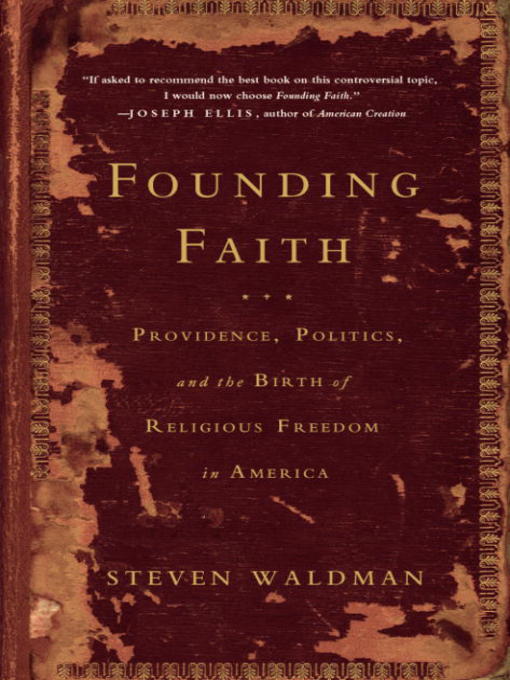The culture wars have distorted the dramatic story of how Americans came to worship freely. Many activists on the right maintain that the United States was founded as a “Christian nation.” Many on the left contend that the Founders were secular or Deist and that the First Amendment was designed to boldly separate church and state throughout the land. None of these claims are true, argues Beliefnet.com editor in chief Steven Waldman. With refreshing objectivity, Waldman narrates the real story of how our nation’s Founders forged a new approach to religious liberty, a revolutionary formula that promoted faith . . . by leaving it alone.
This fast-paced narrative begins with earlier settlers’ stunningly unsuccessful efforts to create a Christian paradise, and concludes with the presidencies of Washington, Adams, Jefferson, and Madison, during which the men who had devised lofty principles regarding the proper relationship between church and state struggled to practice what they’d preached. We see how religion helped cause, and fuel, the Revolutionary War, and how the surprising alliance between Enlightenment philosophers such as Jefferson and Madison and evangelical Christians resulted in separation of church and state.
As the drama unfolds, Founding Faith vividly describes the religious development of five Founders. Benjamin Franklin melded the morality-focused Puritan theology of his youth and the reason-based Enlightenment philosophy of
his adulthood. John Adams’s pungent views on religion–hatred of the Church of England and Roman Catholics–stoked his revolutionary fervor and shaped his political strategy. George Washington came to view religious tolerance as a military necessity. Thomas Jefferson pursued a dramatic quest to “rescue” Jesus, in part by editing the Bible. Finally, it was James Madison–the tactical leader of the battle for religious freedom–who crafted an integrated vision of how to prevent tyranny while encouraging religious vibrancy.
The spiritual custody battle over the Founding Fathers and the role of religion in America continues today. Waldman provocatively argues that neither side in the culture war has accurately depicted the true origins of the First Amendment. He sets the record straight, revealing the real history of religious freedom to be dramatic, unexpected, paradoxical, and inspiring.
An interactive library of the key writings by the Founding Father, on separation of church and state, personal faith, and religious liberty can be found at www.beliefnet.com/foundingfaith.
Founding Faith
Providence, Politics, and the Birth of Religious Freedom in America
-
Creators
-
Publisher
-
Release date
March 11, 2008 -
Formats
-
Kindle Book
-
OverDrive Read
- ISBN: 9781588366740
-
EPUB ebook
- ISBN: 9781588366740
- File size: 438 KB
-
-
Languages
- English
-
Reviews
-
Publisher's Weekly
Starred review from January 28, 2008
Various American evangelicals have claimed the founding fathers as believing and practicing Protestants who intended America to be a Christian nation. Secularists, on the other hand, see in the same historical record evidence that the founders were often Deists at best. Both views are grossly oversimplified, argues Waldman, cofounder and editor-in-chief of Beliefnet.com. In this engaging, well-researched study, Waldman focuses on the five founding fathers who had the most influence on religion's role in the state—Franklin, Jefferson, Washington, Adams and Madison—and untangles their complex legacy. They were certainly diverse in religiosity, with Jefferson a self-diagnosed heretic, for instance, and Washington a churchgoing Anglican who was silent on points of doctrine and refrained from taking communion. All, however, were committed to the creation of religious freedom in the new nation. Waldman deserves kudos for systematically debunking popular myths: America was not primarily settled by people seeking religious freedom; the separation of church and state did not result from the activism of secularists, but, paradoxically, from the efforts of 18th-century evangelicals; and the American Revolution was as much a reaction against European theocracy as a struggle for economic or political freedom. Waldman produces a thoughtful and remarkably balanced account of religion in early America. -
Library Journal
February 15, 2008
Beliefnet.com editor in chief Waldman describes the dramatic birth of religious freedom in the founding of our nation by letting five Founding Fathers Benjamin Franklin, John Adams, George Washington, James Madison, and Thomas Jefferson highlight through original material their efforts in, disagreements and battles over, and approaches to dealing with the place of religion in daily life. Detailed, incisive, and ambitious in scope, this work, more a history of religious freedom than a biography of the founders, enables readers to grasp the beauty and perplexity of the founders' individual journeys and understand how their spiritual states of mind helped to redefine the relationship between religion and government. Waldman concludes that the founding faith was neither Christianity nor secularism but religious liberty. Those familiar with Daniel L. Dreisbach's "The Founders on God and Government" or Jon Meacham's "American Gospel: God, the Founding Fathers, and the Making of a Nation" will find a similar approach here. What makes this a priority addition to both large and small public and academic libraries is Waldman's moving beyond the often counterproductive thinking on this issue. An eight-page bibliography and the 45 pages of footnotes convey the care with which he makes his comments. Leroy Hommerding, Fort Myers Beach P.L. Dist., FLCopyright 2008 Library Journal, LLC Used with permission.
-
Formats
- Kindle Book
- OverDrive Read
- EPUB ebook
subjects
Languages
- English
Loading
Why is availability limited?
×Availability can change throughout the month based on the library's budget. You can still place a hold on the title, and your hold will be automatically filled as soon as the title is available again.
The Kindle Book format for this title is not supported on:
×Read-along ebook
×The OverDrive Read format of this ebook has professional narration that plays while you read in your browser. Learn more here.


